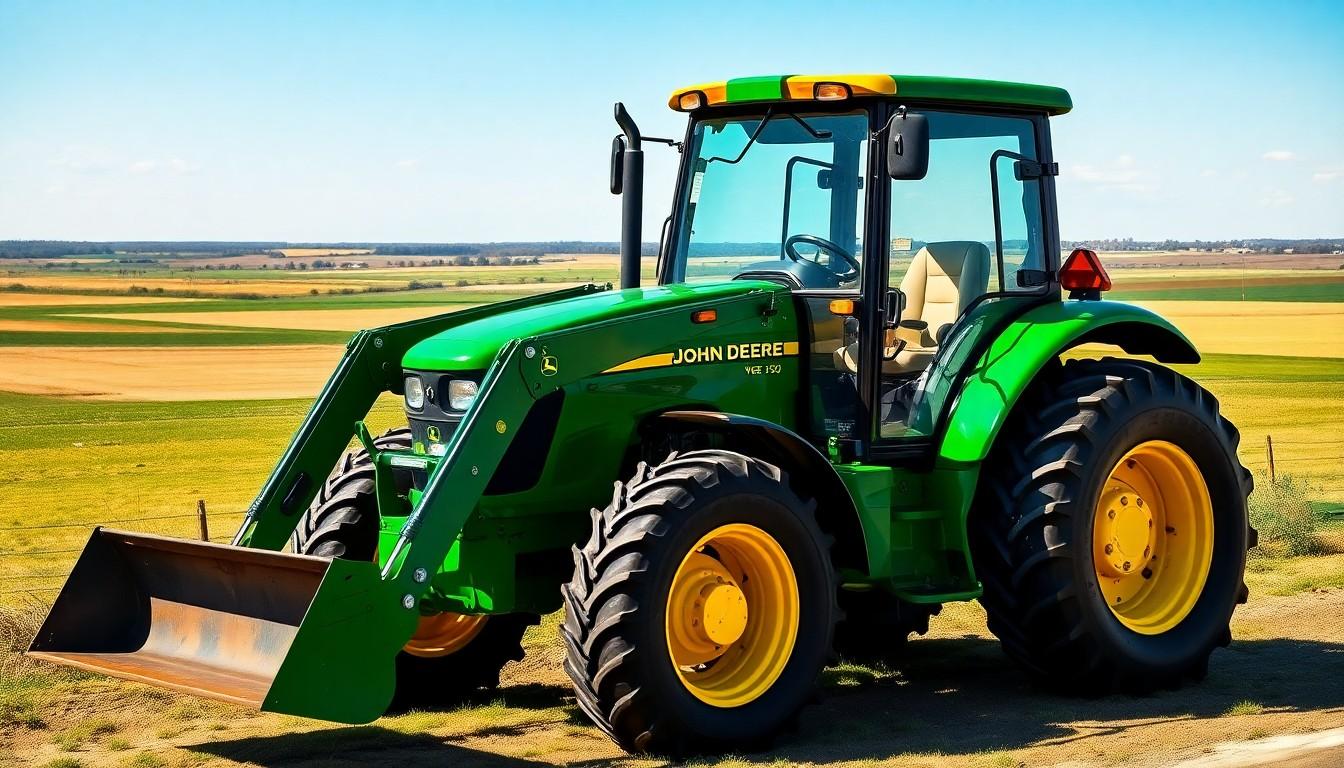The John Deere 790 compact utility tractor has earned its reputation as a reliable workhorse for many farmers and landowners. Yet even though its popularity, even this trusted model isn’t immune to issues that can frustrate owners and impact productivity.
We’ve researched the most common John Deere 790 problems to help you identify and troubleshoot potential headaches before they escalate. From transmission concerns to hydraulic system failures and electrical glitches, understanding these typical pain points can save you time, money, and countless hours of frustration. Whether you’re considering purchasing a 790 or already own one, knowing what to watch for is essential for maximizing your investment.
Common John Deere 790 Problems: An Overview
The John Deere 790 compact utility tractor experiences several recurring issues that owners should recognize. Transmission problems rank among the most frequently reported concerns, with symptoms including difficulty shifting gears, unusual noises, and fluid leaks from the transmission housing. Many owners have documented cases where the transmission unexpectedly jumps out of gear during operation, particularly when under heavy load.
Hydraulic system failures constitute another important problem area for the 790 model. These typically manifest as sluggish or non-responsive implements, leaking hydraulic cylinders, and inadequate lifting capacity. The hydraulic pump may develop issues after extended use, leading to decreased pressure and performance degradation that affects the tractor’s ability to operate attachments effectively.
Electrical system complications plague many 790 tractors, especially in older units. Faulty wiring connections, corroded battery terminals, and problematic ignition switches can cause starting issues, instrument panel malfunctions, and intermittent power loss. These electrical gremlins often become more pronounced during cold weather or damp conditions, leaving operators stranded at inconvenient times.
Engine-related difficulties represent a fourth category of common concerns. Symptoms include hard starting, rough idling, excessive smoke, and unexpected power loss during operation. The fuel system components, particularly the injectors and fuel pump, may develop clogs or wear that impact performance. Air intake restrictions and cooling system inefficiencies also contribute to the engine problems experienced by many 790 owners.
Steering and front-end components often develop excessive play or resistance after years of service. Worn tie rod ends, steering cylinders with internal leaks, and deteriorated bushings can create unsafe operating conditions and accelerated tire wear. These steering issues typically emerge gradually, making them easy to overlook until they become serious safety concerns.
Transmission Issues in the John Deere 790
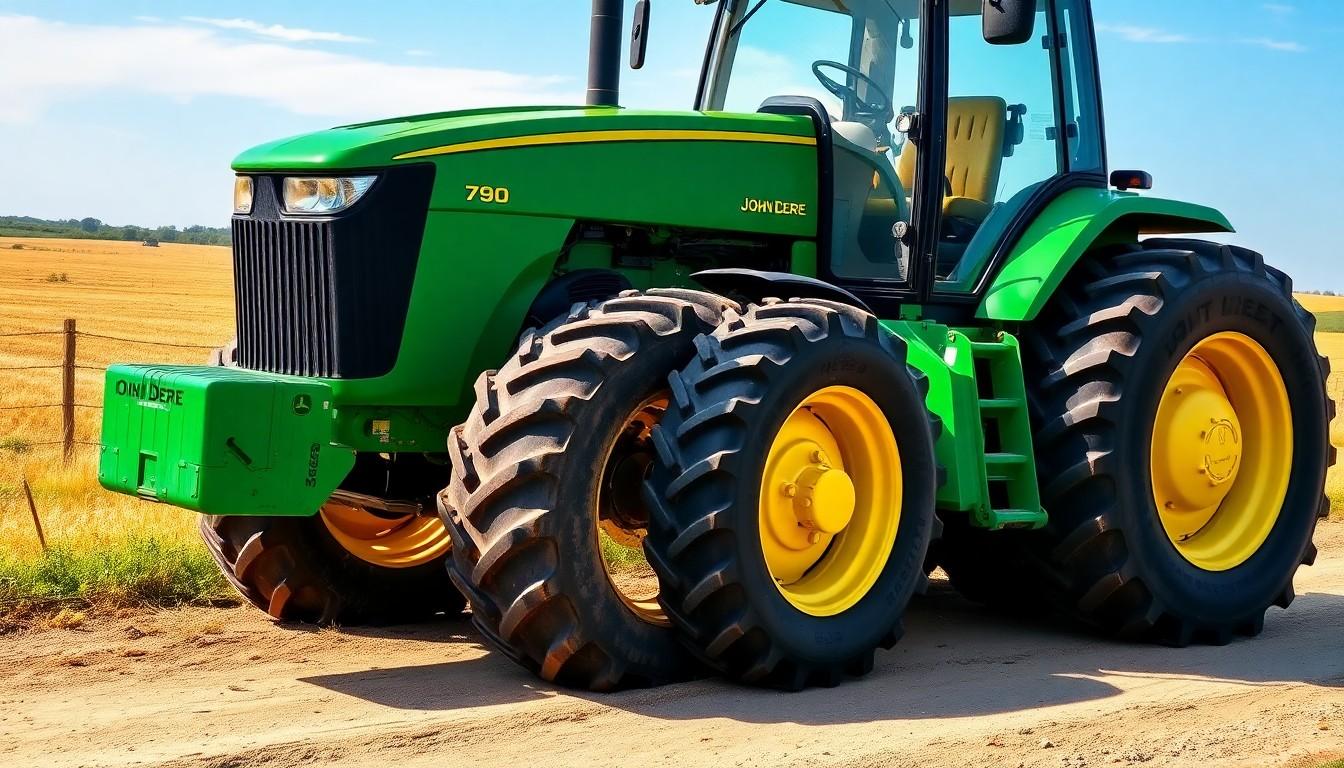
Transmission problems rank among the most commonly reported issues with the John Deere 790 tractor. These complications can significantly impact performance and operational efficiency, often manifesting through exact symptoms that owners should recognize.
Low Transmission Fluid
Low transmission fluid levels frequently cause operational problems in the John Deere 790. Regular checking and maintaining proper fluid levels prevents many transmission failures. Insufficient fluid leads to inadequate lubrication, causing excessive wear on internal components and potential overheating. We recommend implementing a routine maintenance schedule that includes transmission fluid level checks before each major operation or at least monthly.
Worn Clutch Components
A worn clutch manifests through slipping or difficulty captivating gears in the John Deere 790. Signs of clutch wear include unusual grinding noises when shifting and loss of power during operation. Professional replacement becomes necessary when adjustments no longer resolve the issue. Most clutch problems develop gradually, giving operators time to schedule maintenance before complete failure occurs.
Transmission Linkage Issues
Transmission linkage problems directly affect the 790’s gear shifting capabilities. Inspecting linkage components for wear, damage, or misalignment helps identify potential issues early. Common symptoms include increased resistance when shifting gears or inability to fully engage certain gears. Linkage repairs typically involve replacing worn bushings, bent rods, or loose connections that develop through normal use.
Gear Strength Concerns
The John Deere 790’s gear system sometimes struggles to handle the full power of its 30 hp engine. Multiple reports indicate the gears may be insufficiently robust for heavy-duty applications, resulting in premature breakage. This design limitation becomes particularly apparent when the tractor performs high-torque operations like heavy towing or working difficult terrain. Operators can mitigate this issue by avoiding sudden load changes and ensuring proper warm-up before demanding tasks.
Hydraulic System Failures
Hydraulic system issues often interconnect with transmission problems in the 790 model. Low hydraulic fluid causes system malfunctions, leading to inefficient operation and potential damage. Clogged hydraulic filters restrict fluid flow, reducing system efficiency and causing sluggish performance. The hydraulic pump may fail, producing distinctive whining noises and decreased power output. Persistent leakage problems affect the loader hydraulic system, particularly when carrying heavy loads in the bucket, even after replacing cylinders and SCV valves.
Gear Shifting Problems
Hard shifting represents a recurring concern in the John Deere 790 tractor. This common issue can be addressed through regular maintenance practices. Greasing the rear e-joint on the drive shaft improves shifting performance considerably. Some owners report success bypassing the safety seat switch as a simple fix for shifting difficulties. Regular transmission linkage adjustments provide important improvement in gear engagement and overall shifting smoothness.
Engine-Related Challenges
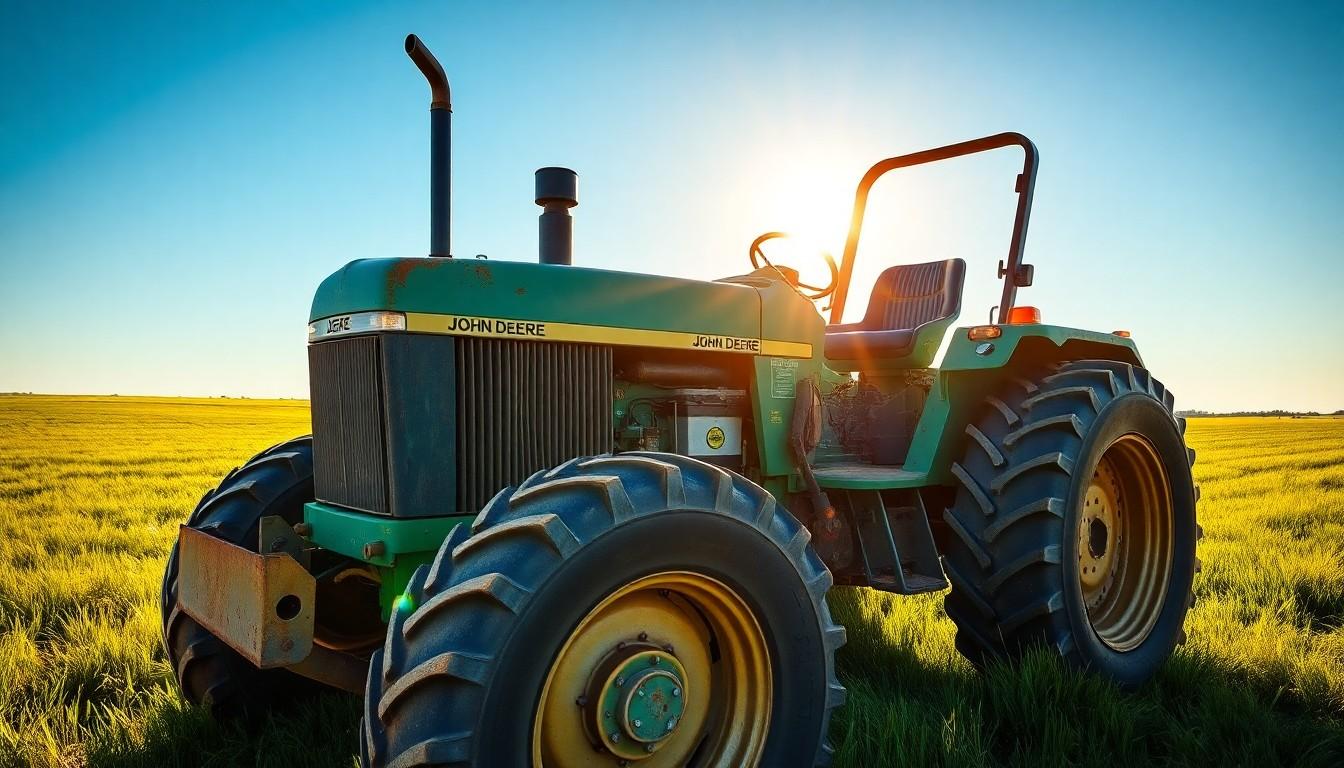
The John Deere 790 tractor experiences several engine-related issues that owners frequently encounter. These problems can significantly impact the tractor’s performance and reliability, often requiring prompt attention to prevent more serious damage.
Starting Difficulties
Starting problems rank among the most common complaints from John Deere 790 owners. Battery issues frequently cause starting difficulties, particularly when batteries become weak or completely dead. Cleaning corroded terminals and ensuring the battery maintains a full charge can resolve many starting problems. Glow plug failure represents another critical starting issue, especially in cold weather conditions when these components are essential for engine ignition. Many operators discover that replacing faulty glow plugs dramatically improves cold-weather starting performance.
Fuel system complications also prevent proper engine starting in many cases. Air trapped in fuel lines creates vapor lock situations that block fuel flow to the engine. Bleeding the fuel system to remove this trapped air often restores normal operation. Clogged fuel filters similarly restrict fuel delivery, causing hard starting or preventing the engine from firing altogether. Regular fuel filter replacement as part of routine maintenance helps prevent these starting challenges.
Some owners report that their tractors run rough, produce excessive soot from the exhaust, and require extended idle periods to warm up properly. These symptoms typically indicate more complex fuel delivery or combustion issues that may require professional diagnosis.
Overheating Concerns
Engine overheating affects many John Deere 790 tractors, particularly during heavy workloads or hot weather operation. Low coolant levels represent a primary cause of overheating issues. Regular inspection and maintenance of proper coolant levels with the manufacturer-recommended coolant type prevents many overheating episodes.
Radiator blockages significantly restrict proper airflow and heat dissipation. Debris, dirt, and plant material easily accumulate in the radiator fins during normal field operation. Thorough cleaning of the radiator to remove these blockages improves cooling efficiency and prevents overheating under load.
Thermostat failures create another common source of overheating problems. When thermostats stick in the closed position, they prevent proper coolant circulation throughout the engine. Replacing malfunctioning thermostats with new OEM components ensures proper temperature regulation and prevents damaging overheating conditions.
Electrical System Defects
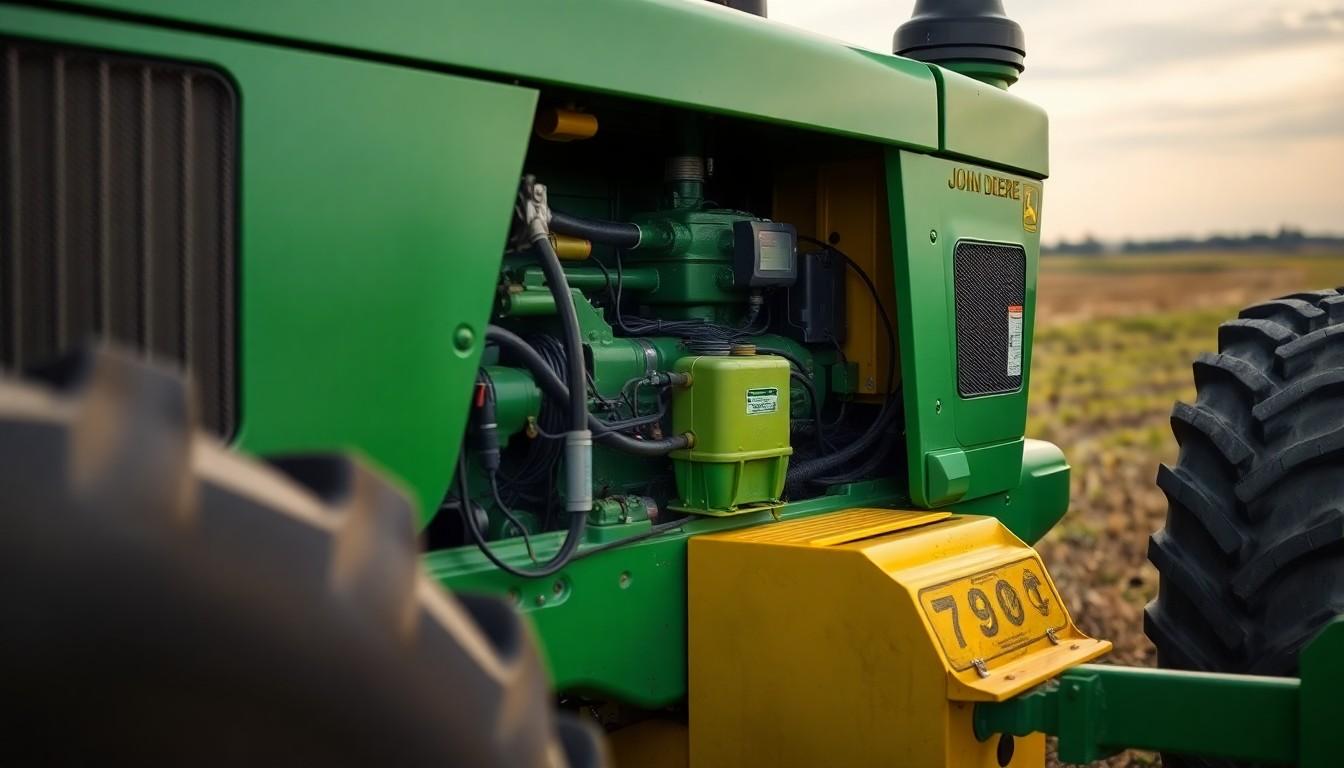
Electrical system defects in the John Deere 790 can bring your tractor to a complete standstill and create frustrating downtime. These issues typically manifest as starting problems, battery drainage, and faulty wiring connections that compromise the overall performance and reliability of your equipment.
Battery Drainage Issues
Battery drainage presents a common headache for John Deere 790 owners, often leaving tractors unresponsive when needed most. Many users report seemingly inexplicable battery depletion even though having components like starters and alternators tested and confirmed to be functioning properly. This persistent drainage can occur even with relatively new batteries, suggesting deeper electrical system complications beyond the battery itself. Regular inspection of connections and cleaning battery terminals can help mitigate these issues, as poor connections frequently contribute to energy loss and starting difficulties in the John Deere 790.
Faulty Wiring Problems
Faulty wiring creates many electrical complications throughout the John Deere 790’s operational systems. Loose connections, corroded wires, and damaged insulation can disrupt the electrical current flow, resulting in intermittent starting issues and unexpected power losses during operation. Electrical connections throughout the tractor require regular inspection and maintenance to prevent performance problems. Cleaning all electrical connection points serves as a primary troubleshooting step when addressing starting issues, as accumulated dirt, moisture, and corrosion often interfere with proper electrical conductivity. PTO clutch malfunctions, while primarily mechanical in nature, can sometimes stem from electrical irregularities that prevent proper engagement or control.
PTO and Hydraulic Lift Malfunctions
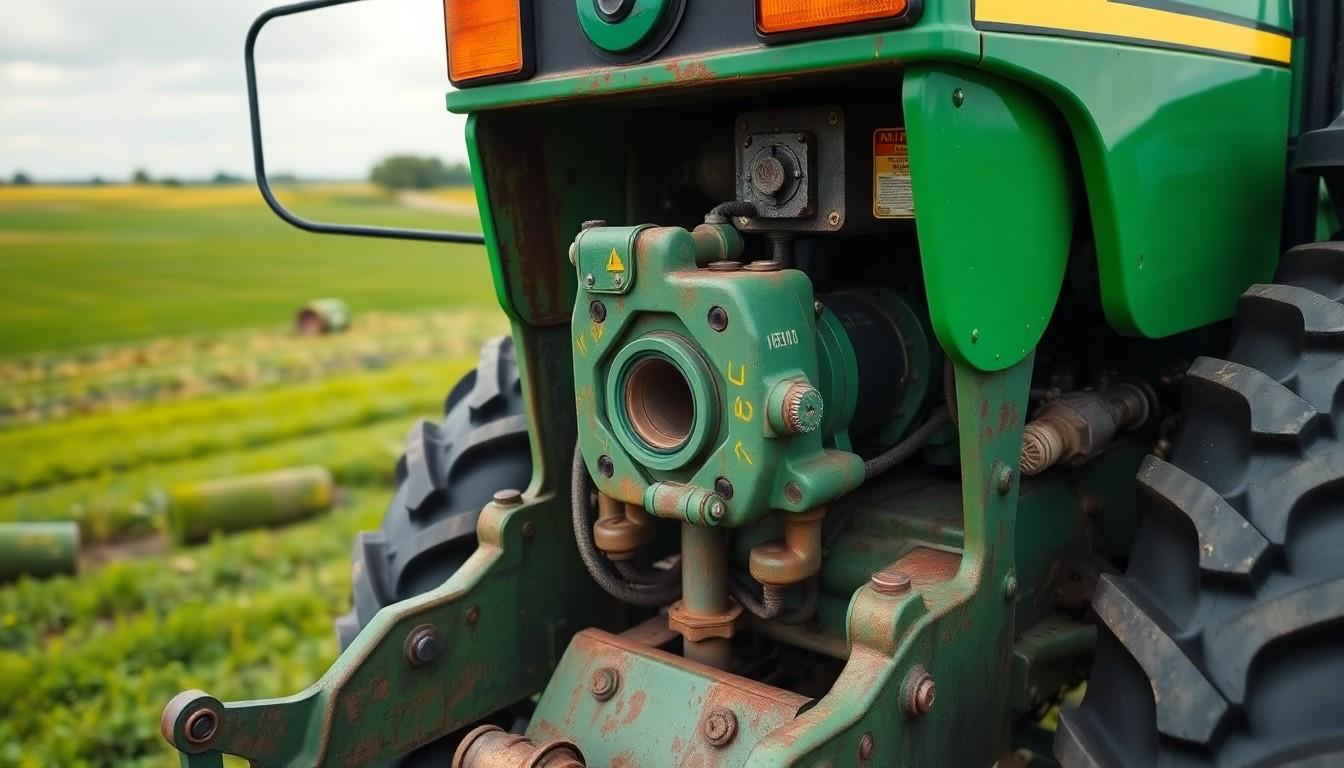
PTO Engagement Issues
PTO engagement problems plague many John Deere 790 tractors, creating frustration for operators during carry out attachment. Users frequently report important gear grinding when attempting to engage the PTO, occurring at both low and high RPMs. This grinding makes smooth PTO engagement nearly impossible in many cases, limiting the tractor’s functionality with PTO-driven implements. While rear PTO systems typically function adequately, the mid PTO presents particular difficulties, often accompanied by severe gear grinding that suggests internal mechanical issues.
Hydraulic System Failures
Hydraulic system failures in the John Deere 790 commonly manifest in the front end components. Oil leaks represent a primary concern, potentially causing the front differential to run completely dry when left unaddressed. Empty differentials lead to component seizing and gear damage, requiring costly repairs and extensive downtime. The 790’s front end design contributes to these problems, with many owners noting it’s built too lightly for the demands placed upon it, especially in older models that have accumulated important operating hours.
Front End Structural Concerns
Front end structural weaknesses compound the John Deere 790’s hydraulic issues, creating a pattern of recurring problems. The relatively light construction of the front assembly doesn’t always hold up under demanding farm conditions, particularly when the tractor reaches advanced age. These structural limitations exacerbate leakage problems and increase stress on hydraulic components, creating a cycle of maintenance challenges for owners. Regular inspection of front-end components helps identify potential failures before they cause catastrophic damage.
Related Electrical Complications
Electrical system problems indirectly affect PTO and hydraulic performance in the John Deere 790 tractor. Unusual gauge readings, such as fuel level sensors affecting temperature readings, indicate electrical system irregularities that may extend to hydraulic control circuits. These electrical quirks sometimes interfere with proper hydraulic operation, creating intermittent performance issues that prove difficult to diagnose. Comprehensive electrical system testing helps identify these hidden contributors to hydraulic and PTO malfunctions.
Steering and Front End Problems
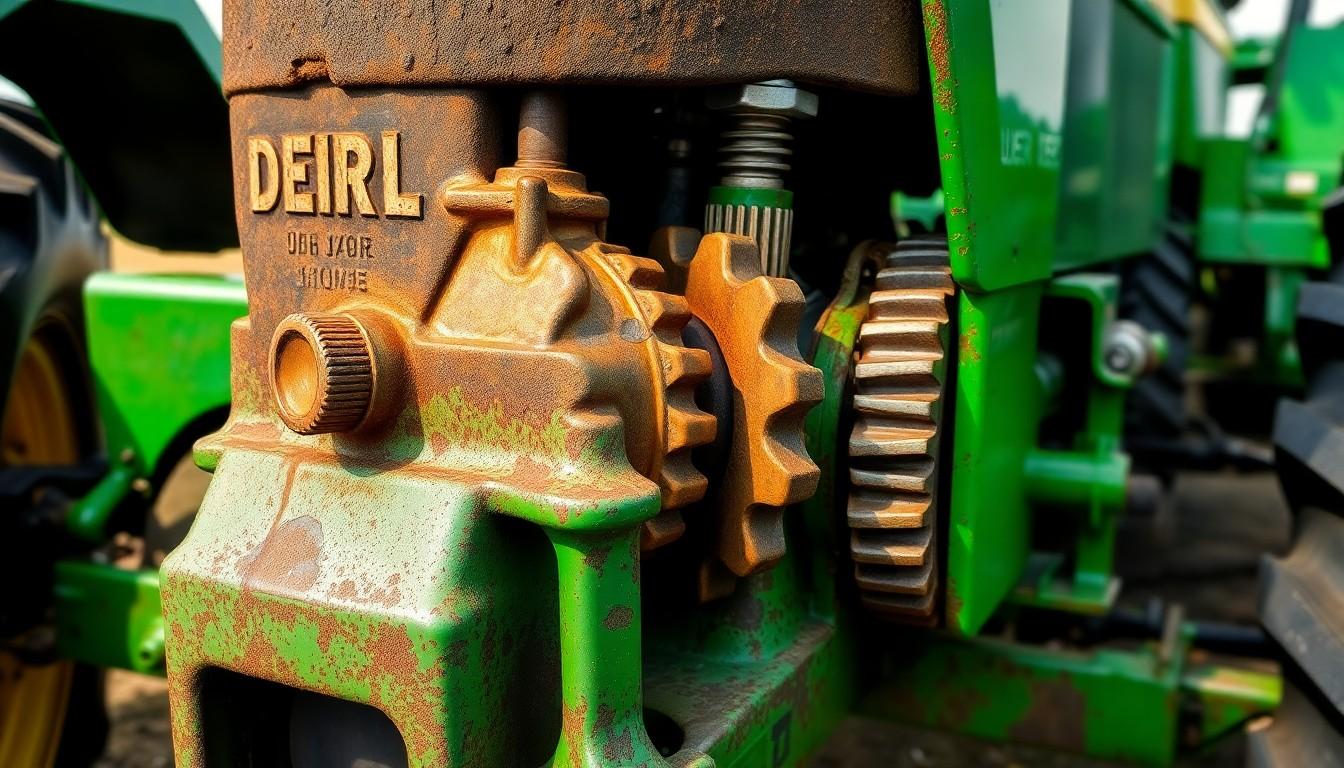
John Deere 790 tractors frequently experience steering and front end issues that can significantly impact their performance and longevity. These problems often manifest as noticeable operational changes that require prompt attention to prevent more serious damage.
Front End Oil Leaks
Oil leakage from the front differential represents one of the most prevalent issues affecting the John Deere 790. When oil seeps out of the front end, the differential can run completely dry, leading to seized components and extensive damage. Many owners have discovered their front differentials completely without oil during maintenance checks, indicating a serious and ongoing problem with the sealing system.
Gear and Bearing Failures
The front end gears in the 790 model are particularly vulnerable to premature failure. Repeated instances of damaged gears necessitate frequent replacements, creating a frustrating cycle of repairs for many owners. These failures typically stem from inadequate lubrication caused by the aforementioned oil leaks.
Bearing problems compound these gear issues, with the upper bearing for the vertical shaft being especially problematic. The snap ring that holds this bearing in place often breaks, allowing the bearing to move out of position. This misalignment causes the front end to bind up, creating noticeable steering resistance and potential safety hazards.
Steering Performance Issues
Operators commonly report feeling a stuttering sensation or hearing unusual noises when turning the steering wheel. These symptoms directly connect to underlying hydraulic system deficiencies and front end component wear. The steering problems become more pronounced during tight turns or when operating at lower speeds, creating challenging handling situations.
Weight Distribution Concerns
Excessive weight concentrated over the front axle accelerates wear on the front end components. This uneven weight distribution places undue stress on the gears and bearings, hastening their deterioration. Tractors frequently used with front-mounted implements experience these issues more severely as the additional weight compounds the existing design limitations.
Repair Complexity
Addressing these steering and front end problems typically requires complete disassembly of the front differential assembly. Though time-consuming, many owners have successfully completed these repairs themselves, spending several hours replacing damaged gears, worn bearings, and installing new gaskets. Regular oil level checks in the front differential serve as the most effective preventive measure against catastrophic front end failures in the John Deere 790.
Fuel System Issues
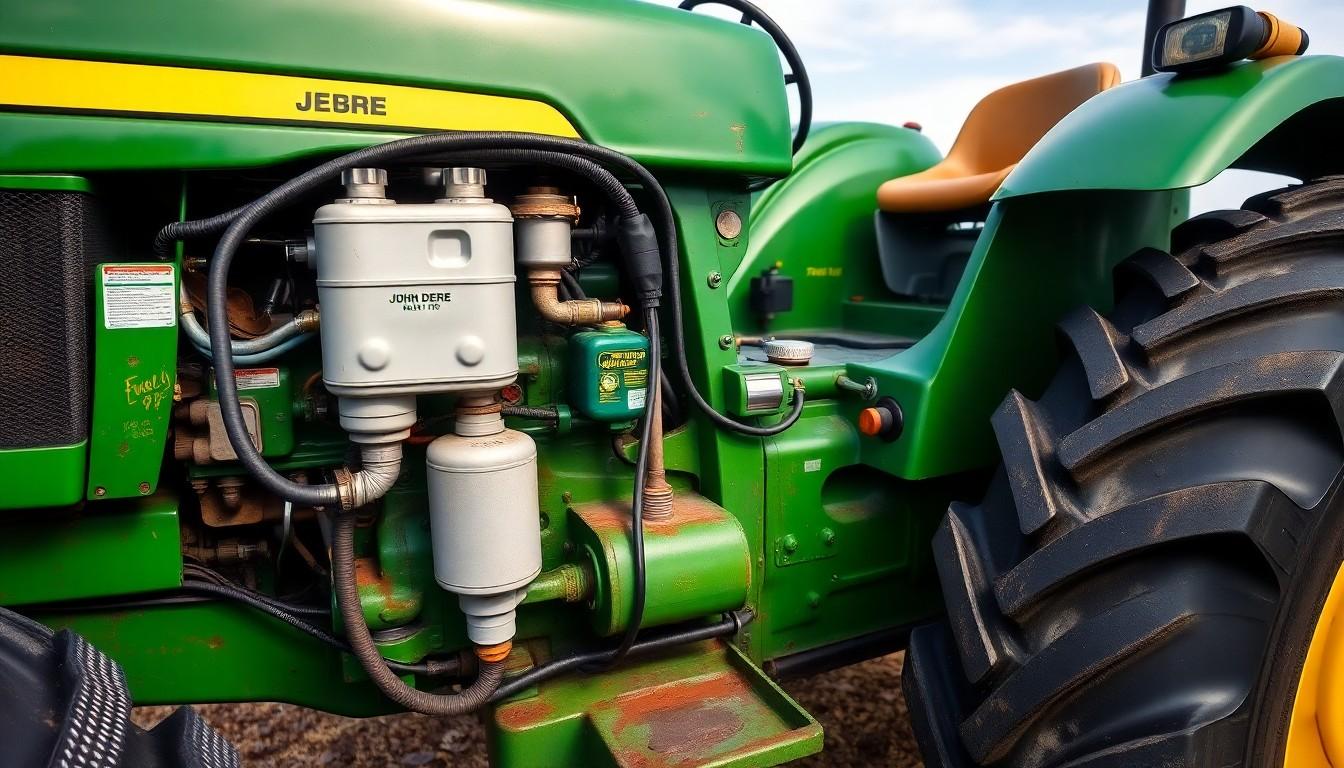
The John Deere 790 tractor frequently experiences fuel system complications that can significantly impact performance and reliability. Fuel pump failures and electrical issues connected to the fuel system are among the most commonly reported problems by owners of this compact utility tractor.
Clogged Filters and Lines
Clogged filters and fuel lines represent critical maintenance concerns for John Deere 790 owners. Regular inspection prevents costly repairs and ensures proper fuel flow throughout the system. Neglecting routine filter checks often leads to diminished performance and potential engine damage over time. Fuel lines require examination for leaks or damage during scheduled maintenance intervals to maintain optimal fuel delivery. Many operators discover problems only after experiencing power loss or engine stalling, which could have been prevented through proactive maintenance.
Carburetor Problems
Carburetor issues in the John Deere 790 typically manifest as secondary concerns related to broader fuel system complications. Though not extensively documented as primary failures, carburetor malfunctions can develop as a result of other fuel system problems. Troubleshooting these issues involves checking for clogged filters, examining fuel flow patterns, and inspecting connecting lines for potential damage. Fuel pump failures, which are more commonly reported than direct carburetor issues, can create symptoms that mimic carburetor problems. Temperature gauge malfunctions connected to fuel levels indicate potential electrical issues affecting the entire fuel delivery system, as evidenced by reports of gauges only functioning when fuel tanks are half full.
Maintenance Tips to Prevent John Deere 790 Problems
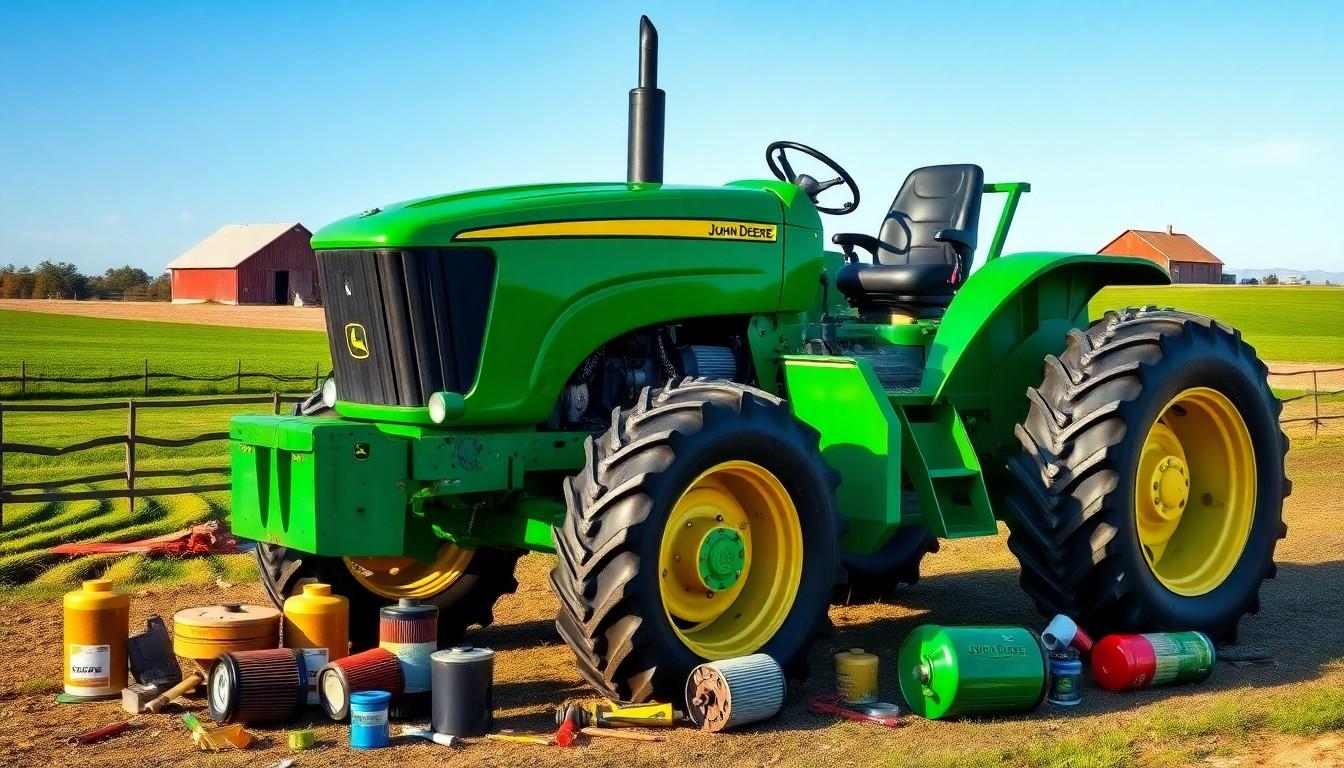
Regular maintenance is key to avoiding the common problems that plague John Deere 790 tractors. Following these service intervals and procedures helps extend your tractor’s lifespan and maintain optimal performance.
Service Intervals and Parts
Proper timing of maintenance tasks prevents major mechanical failures in your John Deere 790. The oil filter requires replacement every 50 to 200 hours, using either the M801209 or M806419 filter depending on your engine configuration. Engine oil changes follow the same 50 to 200 hour interval, with the tractor needing approximately 4.3 quarts of 15W40 oil. Fuel filters should be replaced whenever engine performance drops, especially before changing oil if the filter appears clogged. The coolant system holds about 5.1 quarts and requires regular inspection to maintain proper levels. Air filters need consistent checks and replacement to ensure the engine breathes properly and performs at its best.
Maintenance Procedures
Changing oil correctly protects your John Deere 790’s engine components from premature wear. Start by warming up the engine, then position the tractor on level ground with the parking brake engaged. Raise the hood to access the engine compartment, then remove the oil drain plug and collect the old oil in a suitable container. Next, remove the right side engine shield to access and replace the oil filter, applying a thin film of clean engine oil to the new filter’s gasket. Hand-tighten the filter an additional half to three-quarters turn after the gasket makes contact. Replace the oil filler cap and add the recommended 4.2 to 4.3 quarts of 15W40 oil to complete the service.
Additional Checks
Preventing hydraulic and transmission problems requires vigilant monitoring of fluid levels. Check engine oil, diesel fuel, and coolant levels regularly as part of your routine inspection. Apply MOLY High Temp Grease to moving parts and linkage points to prevent premature wear and ensure smooth operation. Keep the air filter clean and the fuel system free from contamination by inspecting these components frequently. Adding Seafoam to your fuel tank occasionally helps clean the fuel system and prevent clogs that can lead to poor performance.
Environmental Considerations
Operating conditions significantly impact your maintenance schedule for the John Deere 790. Increase service frequency when working in extreme heat, dusty environments, or challenging terrain to compensate for accelerated wear on components. Tractors used for heavy-duty applications need more frequent oil changes and filter replacements compared to those handling lighter tasks. Tailoring your maintenance schedule to match your exact operating conditions prevents unexpected breakdowns and extends the life of critical components.
Conclusion
While the John Deere 790 has earned its reputation as a reliable workhorse, it’s clear that owners should be vigilant about potential issues. By understanding these common problems and implementing proactive maintenance, you’ll significantly extend your tractor’s service life.
We’ve found that most transmission, hydraulic, electrical and PTO concerns can be mitigated through regular service routines. Remember that preventative maintenance is always less costly than reactive repairs.
For current and prospective owners, these insights will help you make informed decisions about purchasing, maintaining and troubleshooting your John Deere 790. With proper care and attention to these known issues, this compact utility tractor can continue to serve your property needs for many years to come.
Frequently Asked Questions
What are the most common issues with John Deere 790 tractors?
The most common issues with John Deere 790 tractors include transmission problems (difficulty shifting gears, unusual noises), hydraulic system failures (sluggish implements, inadequate lifting capacity), PTO engagement difficulties (gear grinding), electrical complications (starting problems, power loss), engine difficulties (hard starting, excessive smoke), steering problems, and fuel system complications. Regular maintenance is essential to prevent these issues and ensure the tractor’s longevity.
How do I identify transmission problems in my John Deere 790?
Look for symptoms like difficulty shifting gears, unusual noises during operation, fluid leaks, or the transmission jumping out of gear under heavy load. You might also notice slipping and grinding noises from worn clutch components. Low transmission fluid levels can cause inadequate lubrication and overheating. These issues typically worsen during heavy-duty applications and can lead to premature component breakage if not addressed promptly.
What causes hydraulic system failures in the John Deere 790?
Hydraulic system failures are commonly caused by pump issues after extended use, low hydraulic fluid levels, clogged filters, and persistent leakage. You might notice sluggish implement response, leaking cylinders, or inadequate lifting capacity. Front-end structural weaknesses can compound these problems, with oil leaks potentially causing the front differential to run dry, resulting in costly repairs and significant downtime.
Why does my John Deere 790 have PTO engagement problems?
PTO engagement problems typically manifest as gear grinding when attempting to engage the PTO, particularly in the mid PTO system. This grinding noise indicates misalignment or wear in the PTO components. These issues significantly limit the tractor’s functionality with PTO-driven implements and can worsen over time if not properly addressed. Regular inspection and adjustment of the PTO system can help prevent these problems.
How can I resolve electrical issues with my John Deere 790?
To resolve electrical issues, check the battery connections for corrosion and ensure they’re tight. Inspect the wiring harness for damage or loose connections. Test the battery’s charge level and replace if necessary. Look for unusual gauge readings that might indicate deeper electrical problems. For persistent issues, particularly in older units or those exposed to damp conditions, consult a qualified technician who specializes in tractor electrical systems.
What maintenance schedule should I follow for my John Deere 790?
Replace the oil filter every 50-200 operating hours and change engine oil within the same timeframe. Regularly check coolant levels, inspect air filters, and monitor hydraulic and transmission fluid levels. Adjust maintenance frequency based on operating conditions—tractors used in extreme environments or for heavy-duty applications require more frequent service. Following this schedule helps prevent major mechanical failures and ensures optimal performance and longevity.
How do I diagnose fuel system problems in my John Deere 790?
Diagnose fuel system problems by checking for clogged filters and fuel lines, inspecting the fuel pump for proper operation, and looking for electrical issues related to the fuel system. Symptoms include hard starting, poor performance, and excessive smoke from the exhaust. Also examine fuel flow patterns, as fuel pump failures can mimic carburetor problems. Regular fuel system maintenance is crucial to prevent diminished performance and potential engine damage.
What causes steering and front-end problems in the John Deere 790?
Steering and front-end problems are often caused by oil leaks from the front differential, inadequate lubrication leading to gear and bearing failures, and excessive weight over the front axle. You might experience stuttering sensations or unusual noises during steering, particularly when making tight turns or operating at low speeds. Regular oil level checks and proper weight distribution can help prevent these issues and avoid costly repairs.

